Exploring the Role of Infodemics in People's Incompliance with Preventive Measures during the COVID-19 in Conflict Settings (Mixed Method Study)
- PMID: 37046879
- PMCID: PMC10093864
- DOI: 10.3390/healthcare11070952
Exploring the Role of Infodemics in People's Incompliance with Preventive Measures during the COVID-19 in Conflict Settings (Mixed Method Study)
Abstract
The evolving availability of health information on social media, regardless of its credibility, raises several questions about its impact on our health decisions and social behaviors, especially during health crises and in conflict settings where compliance with preventive measures and health guidelines is already a challenge due to socioeconomic factors. For these reasons, we assessed compliance with preventive measures and investigated the role of infodemic in people's non-compliance with COVID-19 containment measures in Yemen. To this purpose and to triangulate our data collection, we executed a mixed method approach in which raw aggregated data were taken and analyzed from multiple sources (COVID-19 Government Response Tracker and Google COVID-19 Community Mobility Reports), then complemented and verified with In-depth interviews. Our results showed that the population in Yemen had relatively complied with the governmental containment measures at the beginning of the pandemic. However, containment measures were not supported by daily COVID-19 reports due to low transparency, which, together with misinformation and lack of access to reliable sources, has caused the population not to believe in COVID-19 and even practice social pressure on those who showed some compliance with the WHO guidelines. Those results indicate the importance of adopting an infodemic management approach in response to future outbreaks, particularly in conflict settings.
Keywords: COVID-19 preventive measures; Infodemic management; health crises; health misinformation; incompliance; information access; information source; restriction on movement; social behaviors.
Conflict of interest statement
The authors declare no conflict of interest.
Figures



Similar articles
-
Management of infodemics in outbreaks or health crises: a systematic review.Front Public Health. 2024 Mar 15;12:1343902. doi: 10.3389/fpubh.2024.1343902. eCollection 2024. Front Public Health. 2024. PMID: 38566799 Free PMC article.
-
Role of Infodemics on Social Media in the Development of People's Readiness to Follow COVID-19 Preventive Measures.Int J Environ Res Public Health. 2022 Jan 25;19(3):1347. doi: 10.3390/ijerph19031347. Int J Environ Res Public Health. 2022. PMID: 35162369 Free PMC article.
-
From infodemic to resilience: Exploring COVID-19 protective measures in armed-conflict zone.Risk Anal. 2024 Nov 11. doi: 10.1111/risa.17670. Online ahead of print. Risk Anal. 2024. PMID: 39526536
-
Framework for Managing the COVID-19 Infodemic: Methods and Results of an Online, Crowdsourced WHO Technical Consultation.J Med Internet Res. 2020 Jun 26;22(6):e19659. doi: 10.2196/19659. J Med Internet Res. 2020. PMID: 32558655 Free PMC article.
-
Infodemic Management in the Twenty-First Century.2023 May 10. In: Purnat TD, Nguyen T, Briand S, editors. Managing Infodemics in the 21st Century: Addressing New Public Health Challenges in the Information Ecosystem [Internet]. Cham (CH): Springer; 2023. Chapter 1. 2023 May 10. In: Purnat TD, Nguyen T, Briand S, editors. Managing Infodemics in the 21st Century: Addressing New Public Health Challenges in the Information Ecosystem [Internet]. Cham (CH): Springer; 2023. Chapter 1. PMID: 39556681 Free Books & Documents. Review.
Cited by
-
Exploring Predictors of Social Media Use for Health and Wellness during COVID-19 among Adults in the US: A Social Cognitive Theory Application.Healthcare (Basel). 2023 Dec 23;12(1):39. doi: 10.3390/healthcare12010039. Healthcare (Basel). 2023. PMID: 38200945 Free PMC article.
-
Management of infodemics in outbreaks or health crises: a systematic review.Front Public Health. 2024 Mar 15;12:1343902. doi: 10.3389/fpubh.2024.1343902. eCollection 2024. Front Public Health. 2024. PMID: 38566799 Free PMC article.
-
Social Media Fact-Checking: The Effects of News Literacy and News Trust on the Intent to Verify Health-Related Information.Healthcare (Basel). 2023 Oct 22;11(20):2796. doi: 10.3390/healthcare11202796. Healthcare (Basel). 2023. PMID: 37893870 Free PMC article.
-
Experiences of Governments and Public Health Agencies Regarding Crisis Communication During the COVID-19 Pandemic in the Digital Age: Protocol for a Systematic Review of Qualitative Studies.JMIR Res Protoc. 2024 Jun 27;13:e58040. doi: 10.2196/58040. JMIR Res Protoc. 2024. PMID: 38935414 Free PMC article.
-
Knowledge, attitudes, and practices toward COVID-19 prevention in Yemen: a community-based cross-sectional study.Front Public Health. 2023 Jul 10;11:1178183. doi: 10.3389/fpubh.2023.1178183. eCollection 2023. Front Public Health. 2023. PMID: 37492140 Free PMC article.
References
-
- Bazelaire M. Communicating on Social Media in 2022. [(accessed on 15 November 2022)]. Available online: https://www.laniche.com/blog/communicating-on-social-media-in-2022/
-
- Datareportal Global Social Media Statitics. November 2022. [(accessed on 15 November 2022)]. Available online: https://datareportal.com/social-media-users#:~:text=Analysis%20from%20Ke....
-
- Simplilearn Importance of Social Media in Today’s World. 19 October 2022. [(accessed on 15 November 2022)]. Available online: https://www.simplilearn.com/importance-of-social-media-in-todays-world-a....
-
- Ye X., Li S., Yang X., Lee J., Wu L. Big Data Support of Urban Planning and Management. Springer; Berlin/Heidelberg, Germany: 2018. The fear of Ebola: A tale of two cities in China; pp. 113–132.
LinkOut - more resources
Full Text Sources

